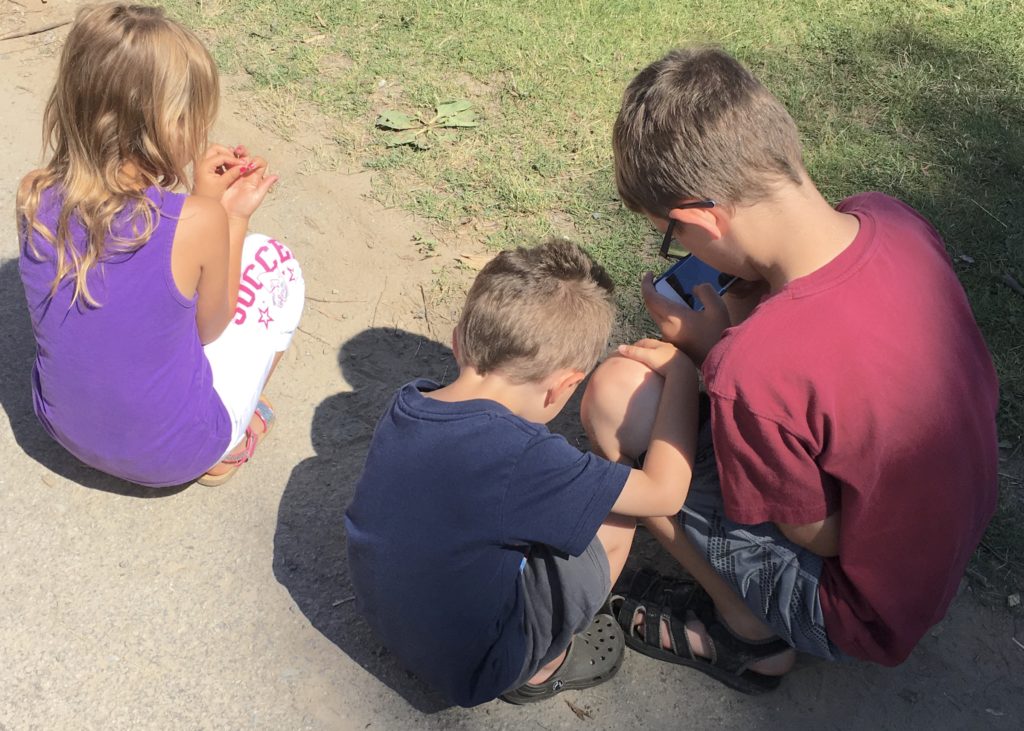
These kids are doing what comes naturally to them, being curious. They were waiting in a long line with their parents to board a tall ship at the lake. To make the most of the time, they examined the ground at their feet, and even photographed what they found.
Curiosity is one of the nine contemplative habits. I’ve written about it before – here and here. We’re all born curious but it sometimes gets dampened as we grow up and filter our responses to life. In many ways, society doesn’t encourage or cultivate this quality.
Recently, I read a book by film producer Brian Grazer called A Curious Mind(paid link). Grazer has hundreds of film and television credits, from the TV series’ 24 and Friday Night Lights to the movies, Apollo 13 and A Beautiful Mind. And, he owes much of his success to his curious mind. As a matter of fact, he sees it as his most important trait. The book is a delight and includes many entertaining stories from his varied career and the people he’s been lucky to meet.
Grazer makes the case for curiosity as a valuable quality and one that can be reawakened at any age. He describes curiosity as being on a spectrum. It comes in different shades and intensities for different purposes. I see four key areas where we can begin to strengthen our curiosity muscles. They’re outlined below along with ideas from the book.
A path to self-awareness and discovery.
Grazer says that curiosity begins as an impulse, an urge, a desire, and pops out as a question. It infuses everything with a sense of possibility. However, it must be harnessed to two other traits – the ability to pay attention to the answers to your questions and the willingness to act.
When we get curious about things outside of ourselves, we expand our world. We learn about new ways of being and living, people and places, as well as general knowledge. I’ve always felt that I was a pretty curious person. I’m an avid reader and have a hunger to keep growing and learning. I tend to follow my curiosity wherever it takes me.
You can also get curious about yourself. What’s holding you back? What are you most interested in? Where do you judge and limit your experience? Getting curious about trying something new, or wondering if you can move beyond limiting fears can give you the impetus to take the next step. This builds independence and confidence.
For example, when I witnessed an environmental sustainability project at a local university, I wondered if I could go back to school at almost age 50 and get a Masters degree. My background was in Mathematics, so I’d written almost no papers as an undergraduate. I did and could.
You can even get curious about your photographs. When you’re drawn to a scene or subject, ask yourself who, what, when, where, and why? The why is the most important and just might provide clues as to where your best photographs will come.
A way to keep relationships fresh.
Grazer says that he is curious in a particular way – emotional. He wants to understand what makes people tick. As a young adult, Grazer started having curiosity conversations with people from all walks of life as a way to expand his world. Connecting with other human beings requires sincerity, compassion, and trust – all of which begin with curiosity. Grazer develops these qualities through his conversations.
He calls familiarity the enemy of curiosity. When we care about someone, we must continue wondering about them. Once we stop listening, the connection begins to fade. And, this is how relationships die.
To create a questioning culture within your family or your workplace means that you have to ask questions with a genuine desire to listen to the answer. You can’t ask in such a way that it seems you already know the answer. And, you must consider the answer seriously. If you don’t, you’ll decrease engagement and trust, and foster cynicism.
Curiosity equips us with the skills for open-hearted, open-minded exploration. It is a state of mind, a kind of receptivity. And, this state of mind can be practiced through photography. Instead of looking for pictures, be open to receive them.
A tool for creativity.
Curiosity infuses everything with a sense of possibility. It sparks inspiration, which when acted on can lead to new ideas, a work of art, or a great story. Yet, it needs persistence to come to fruition. Grazer describes how persistence and curiosity go hand in hand. Persistence without curiosity takes you off course. Persistence drives you forward. Curiosity provides the navigation.
Towards the end of the book, Grazer wonders whether the Internet, with all of human knowledge at our fingertips, makes us more or less curious. It’s important to know that the Internet can only tell us what we already know. You can’t google a new idea or a question that has never been asked.
A path to change.
Asking questions isn’t just a way of understanding the world. It’s a way of changing it, according to Grazer. And, this is what makes it so powerful. Grazer says that curiosity is inconvenient and dangerous. It isn’t just impertinent. It’s insurgent. It’s revolutionary.
Curiosity is at the heart of democracy, which requires accountability. We as citizens need to be able to ask the hard questions about what’s best for our communities – of ourselves, of the press, of our government officials. According to Grazer, democracy is the societal framework that gives the freest rein to our curiosity in every other arena.
Where do you need to be more curious?
Watch: Brian Grazer on Oprah’s Super Soul Sunday